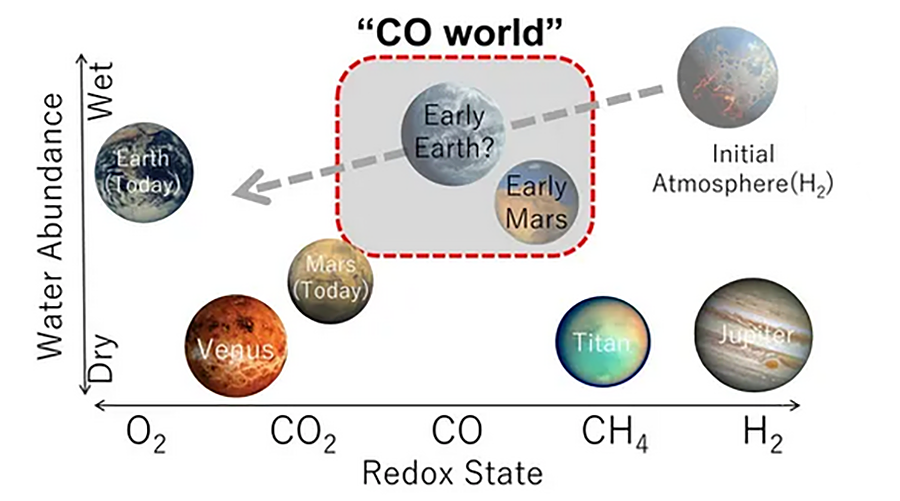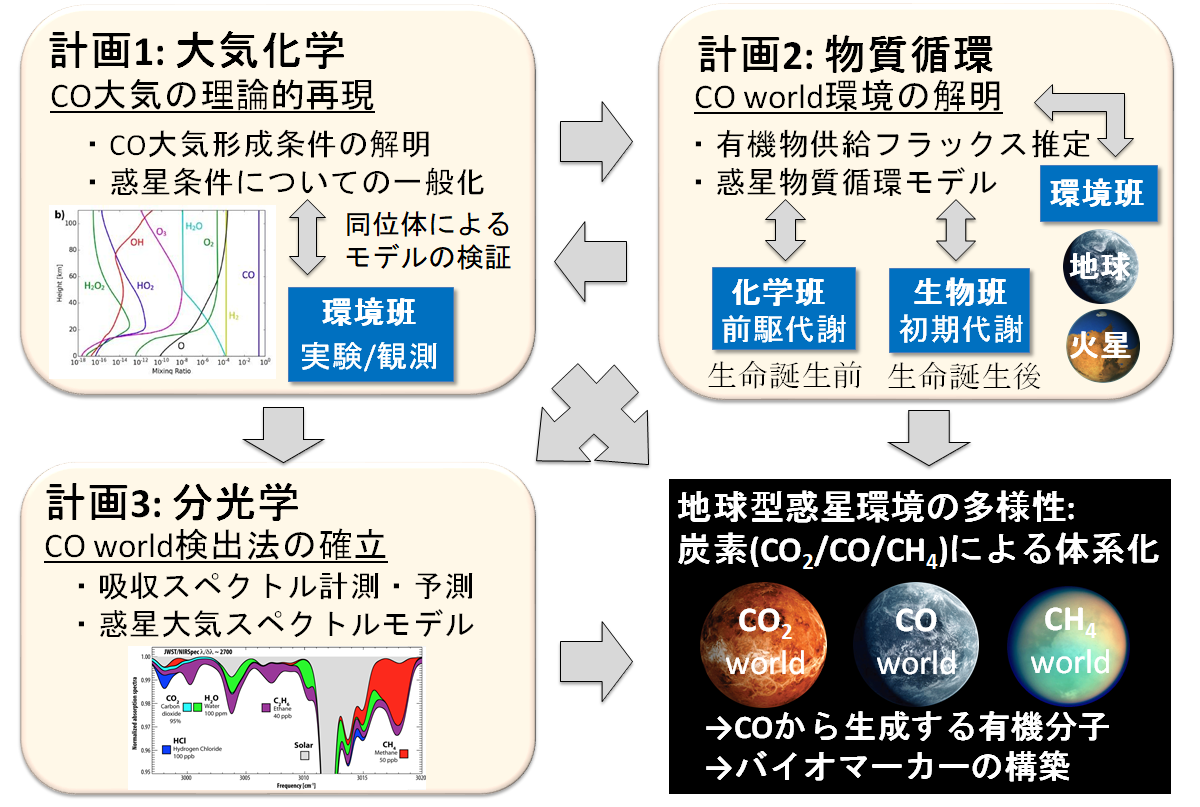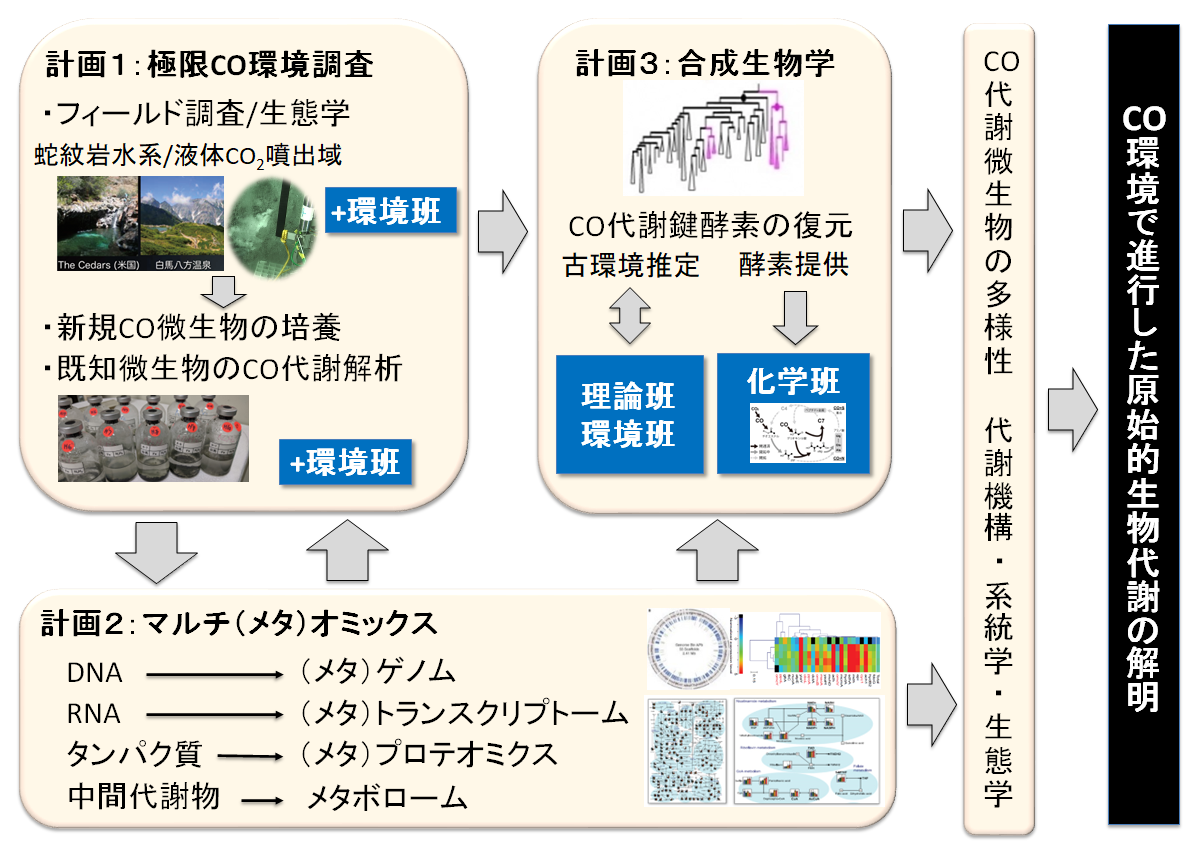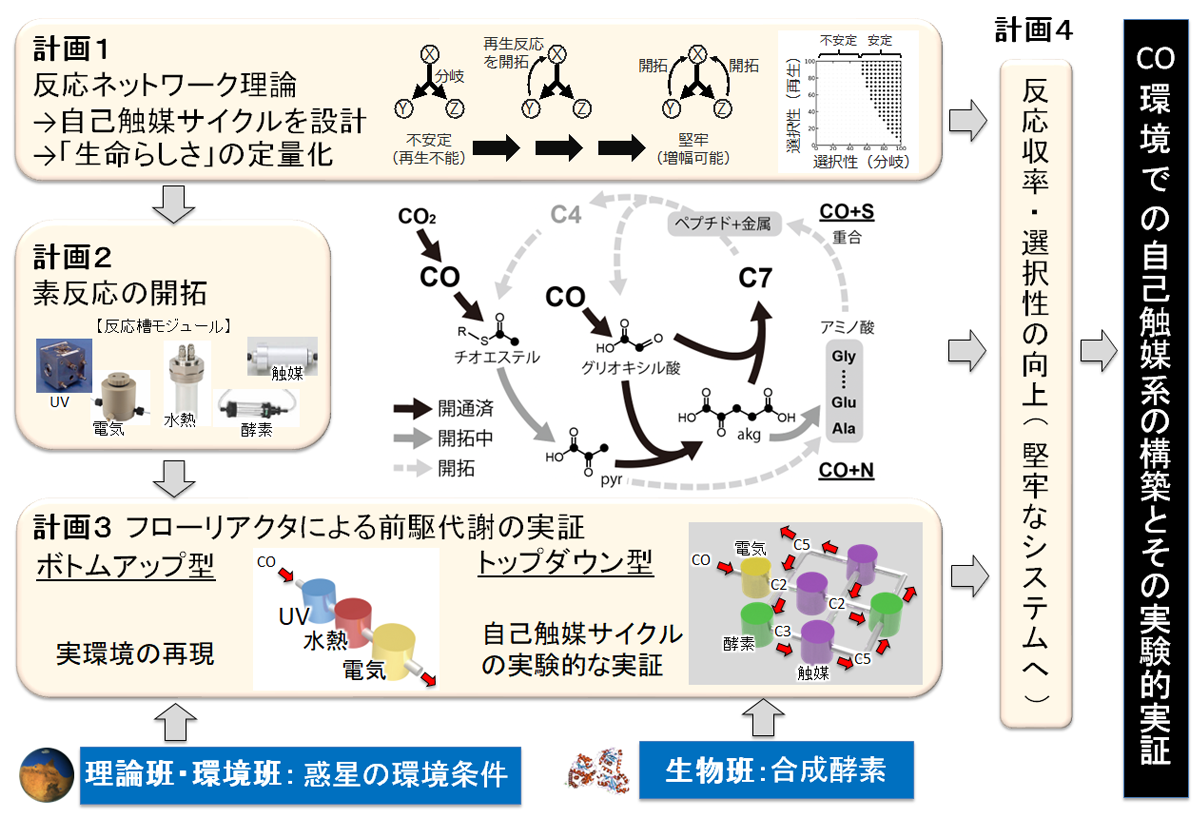CO world: CO環境の生命惑星化学
Why CO world?
本領域は、生命を生み出すのに必要な惑星環境を解明することを目的とし、一酸化炭素COから有機分子が生成する惑星環境(CO world)の研究を学際的に推進することでブレークスルーを生み出す研究計画である。
これまでの天文観測や惑星探査によって、地球以外にも、生命活動の可能な天体が次々に発見され、これらの天体に、生命の痕跡を発見することを目指した観測がすでに始まっている。しかしながら、どのような惑星環境が生命の誕生に必要なのか?という根本的な問題は未解明である。本領域では、酸化還元状態に応じた主要な炭素の化学種(CO2/CO/CH4)の違いがもたらす惑星環境の多様性を俯瞰し、その体系化を目指す。なかでも、COに富む環境は、多様な有機分子を合成するのに適している。一方、微生物代謝を見ても、最古の炭素固定経路とされるアセチルCoA経路のみがCOを炭素源として利用できることも地球生命の初期代謝にとって極めて興味深い。さらに近年、初期の地球や火星の大気にCOが存在したことが理論的に予測され、その地球化学的な証拠も見つかっている。

惑星環境の多様性とCO world
Our Approach
この領域では、従来見過ごされてきたCO worldの研究を、4つの学問分野の融合により推進する。A01 理論班とA02 環境班は、それぞれ惑星大気・物質循環の理論モデルと同位体分子等の地球化学的な観測・実験から、初期の地球や火星、その他の系外惑星の大気にCOがどれだけ存在するのか、また、そのCOからどの種の有機分子がどれだけ生成するのかを明らかにする。一方、A03 生物班とA04 化学班は、そのような惑星環境の下で、どのような生態系と化学反応系が成立するのかを明らかにする。生命を生み出すには、材料となる有機分子が存在するだけでは不十分である。むしろ、それらの材料分子が常に生み出される反応のシステムが環境中に存在している必要がある。本領域は、COに着目することにより、生命代謝につながる化学系(前駆代謝系)が、現実の惑星環境において成立することを実証する計画である。また、こうした学際的取り組みを通し、今後の天文観測と惑星探査において生命活動の痕跡を判別するための具体的方法を提示することにより、当該分野の変革をもたらす。

領域概要
From Planet to Life
生命を生み出すにはどのような惑星環境が必要だろうか?現在の生物が持つ中心代謝と同様の化学系は、酵素の代わりに、最初は地球の用意した無機触媒によって駆動することが可能であったと考えられる。このような化学は前駆代謝と呼ばれる。CO worldにおいては、大気COから絶え間なく生成するアルデヒドや有機酸によって前駆代謝系を持続的に駆動することが期待できる。また、この反応系が、それを構成する分子の自身を生成すると、自己触媒サイクルが成立し、より効率的にアミノ酸等の分子が生み出される。さらにこれらが重合し、活性を持てば、無機触媒を置き換え、この化学系自身が環境から徐々に自立できる。本領域では、この例のように惑星環境中で成立し、生命に繋がる(もしくは繋がった)化学系を構築することで生命の起源に迫る。

作業仮説:CO worldで成立する前駆代謝
計画研究班
A01 理論班: 惑星CO環境のモデリング
理論班は、大気中の炭素の酸化還元状態(CO2/CO/CH4)に応じた地球型惑星環境の多様性を(生物)地球化学に基づく理論的見地から総合的に理解し、次世代望遠鏡を用いた生命を宿す惑星(生命惑星)の探査に向けた理論的基盤を確立する。特にCOを主成分とする惑星大気中で、生命の前駆代謝に重要な有機化合物の生成フラックスや環境状態を明らかにする。また、太陽系外惑星としての検出可能性を検証し、惑星CO環境を総合的に理解することを目指す。具体的な達成目標は
1)地球型惑星がCO大気をもつ物理化学的条件の解明
2)初期地球や初期火星に代表される惑星CO環境中で生じる物質循環過程の定量評価
3)CO2/CO/CH4 大気の分光特性の包括的理解と惑星CO環境の検出法の確立である。

A02 環境班: 初期地球と火星におけるCO環境の解読
環境班は、地球と火星の初期環境を復元する。直接観測できない過去の大気化学、生物活動、無機合成過程を解読するために、環境班は分子レベルの安定同位体比計測法(同位体分子計測)を開発する。大気・生物・化学過程でそれぞれ生成する有機分子が示す同位体分子組成の特徴を明らかにし、大気化学と生物過程によりCOから生成した有機分子を判別する指標(バイオマーカー)を確立する。大気COの化学過程は火星大気の観測と室内での光化学実験により解明し、CO大気から供給される有機分子とその同位体分別の特徴を明らかにする。また、生物過程については、極限CO環境の観測を生物班と協働し行い、同位体分子計測を適用することで、初期地球アナログ環境の物質循環を解明するとともに、生物指標の有用性を実証する。以上の同位体指標と、理論班と協働で構築する大気モデルを用いて、地球史岩石試料および火星隕石に残る有機分子の同位体異常を解析することにより、初期地球および火星において、大気COを起点とする物質循環を明らかにし、生物の存否も含めたそれらの初期惑星環境を解読する。

A03 生物班: CO環境で成立する生物圏の解明
生物班は、未だ不明な部分が多いCO駆動型微生物の知見を拡充し、COが駆動する始原的生命代謝に迫る。酸素に満ちた現在の地球においてCO環境は例外的であるため、微生物によるCO代謝に関する我々の理解は未熟である。本計画研究では、現在の地球環境に残る古環境アナログで、酸化還元度の異なる2つの極限CO環境「非生物由来のCH4とCOが共存する超還元蛇紋岩水系」および「CO2とCOが共存する深海の液体CO2プール環境」でフィールド調査を行う。それらのオミックス解析、新規CO代謝微生物の分離培養・代謝解析、進化学的解析を行うことで、CO駆動型生命のエネルギー代謝、炭素固定、生体分子合成に至る過程の多様性を提示するとともに、COが駆動する微生物代謝の成因・特性・環境制約を体系的に明らかにする。これらの知見に基づき、CO環境と生命の接点となる酵素・経路を同定し、合成生物学的手法・生化学的手法を用いて創出・解析し、その特性を明らかにする。これらを統合し、CO環境における生物-環境相互作用の実態を明らかにするとともに、いかなるCO環境でどういった原始的生命代謝が進行したかを提示する。

A04 化学班: CO環境で駆動される前駆代謝システムの実証
化学班は、COを起点として惑星環境中で成立する自己触媒ネットワーク(前駆代謝)を理論的に追究し、実験により実証する。まず、数理モデルから、自己触媒作用の発生に必要な反応ステップの組み合わせ候補と反応選択性の数値目標を導き出す。この設計に基づき、実験ではCOやその派生物を炭素源とした有機酸生成ルート、及びN2や硝酸を窒素源としたアミノ酸・ペプチド・核酸塩基の生成ルートを順次開拓する。また、アミノ酸/ペプチド-鉱物複合体触媒を開発し、反応選択性の向上に利用する。さらに、多段階ステップをカスケード式に駆動するフローリアクターを開発し、実験で開拓した素反応を連結することで、一連のシステムとして自己触媒ネットワークを実証する。生物班(A03)と連携し、始原的CO代謝についての情報提供を受けると共に、直ちに実現困難な反応ステップがあれば、合成生物学的手法で作り出す疑似酵素を用いる(トップダウン型アプローチ)。一方、ボトムアップ型アプローチとして、理論班(A01)・環境班(A02)が導き出すCO環境を模擬し、COを含む単純な無機物から、アミノ酸・核酸塩基などの生命のBuilding blocksが持続的に生じる惑星化学プロセスを実証する。
